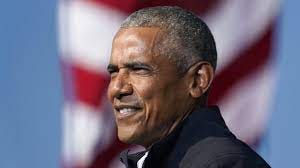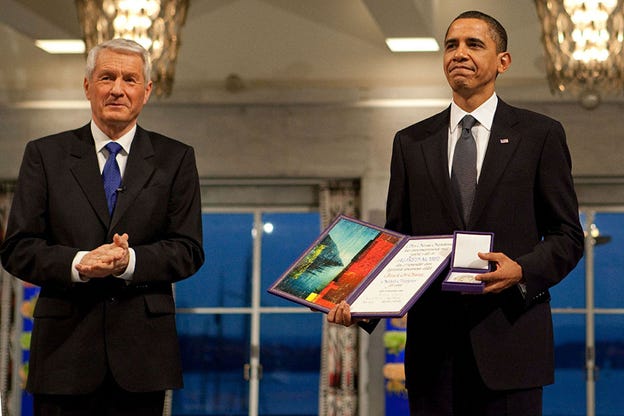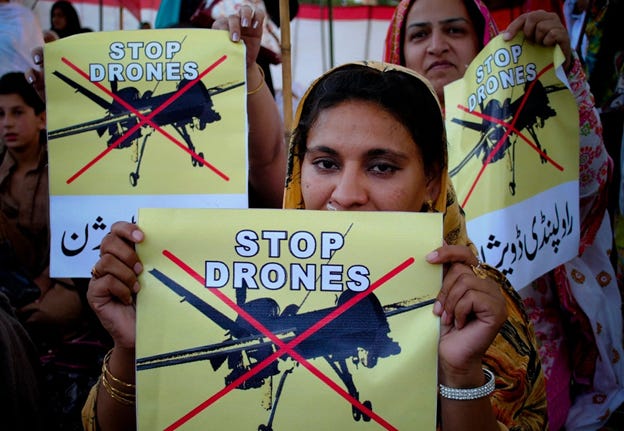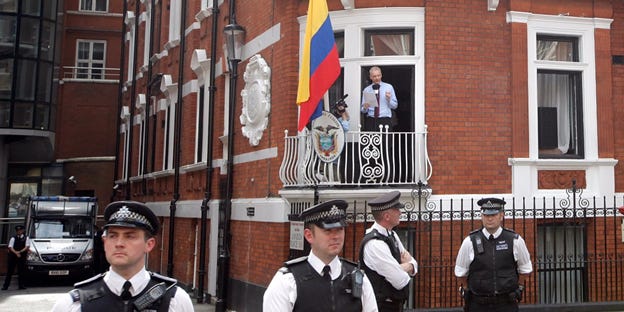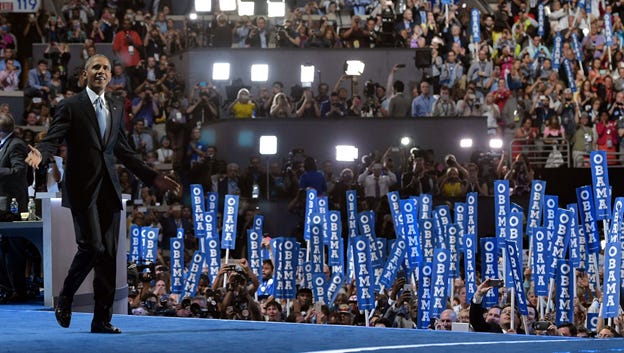Barak Hussein Obama began his first days in office as the 44th President of the United States issuing executive orders to direct the US military to begin formulating plans to withdraw troops from Iraq, ordered the closure of Guantanamo Bay detention camp and revoked President Bush's prohibition of federal aid to international family planning organizations.
One could speculate that what Obama did in those first few days of office was enough to earn him the Nobel Peace Prize, as nominations to the 2008 Norwegian Nobel Peace Prize Committee closed just 8 days after Obama took office.
Obama's first days all seemed consistent with the arrival of the "messiah" who carried the hopes and dreams of not only the American people, but those of the rest of the world, in a bid to banish the unpleasant memories and dark deeds of his predecessor.
Although Obama worked hard to implement a number of domestic policy pledges like re-establishing embryonic stem cell research grants, proposed new regulations to regulate greenhouse gases, expanded hate crime laws, introduced the "don't ask don't tell" policy for gays in the armed services, passed and enacted the Patient Protection and Affordable Care Act, and appointed two female Supreme Court Judges, one being Hispanic; these measures have fallen short of creating any lasting legacy to date.
But the first cracks in the shiny silver armor of this angel from heaven surfaced before his election in 2008. Obama supported the Emergency Economic Stabilization Act 2008 creating a $700 Billion fund to bail out the financial industry. Although both the Congress and Senate had many reservations and many sections of the public were suspicious of a bill bailing out the very people who were seen as partly responsible for the financial crisis, Obama in a rush to be seen as doing the right thing to save the financial system, personally put the bill under little scrutiny, opting to publicly support it in the name of preventing a financial meltdown and severe economic depression.
Although Obama espoused the needs of Main Street over Wall Street, rhetoric well received during by the electorate during the campaign, his action supported Wall Street and big business. Soon after taking presidential office the automobile manufacturers who flew into Washington Congressional hearings on private jets were also given a bailout.
During Obama's first term the great opportunity to clip the wings of the financial institutions, seen by many to be the culprit of 2008, and a law unto themselves, was squandered through lack of will and action on Obama's part. He would have had the people behind him which would have put great pressure on Congress to act, but chose the easy way out. Instead, the likes of Goldman Sachs got tapped lightly on the fingers with fines easily affordable for the financial giant.
Although Obama pulled troops out of Iraq, Afghanistan seems to be a stalemate, not un-similar to the position of the Soviets in the 1980s in the same theatre of war. Obama has actually increased troop numbers rather than reduce them. The quandary Obama faces is when US and NATO troops leave Afghanistan as planned in 2014 is - how long will it take the Taliban to retake control of the country again? The Taliban retake, if it happens on the Obama watch will highlight a military and foreign policy failure which the current president will have to wear.
With the changing nature of battle and public criticism of US troop casualties, new technologies available have allowed the pursuit of a more painless way of taking military action as far as the public is concerned through the use of drones. Drones have become Obama's weapon of choice. Easy, convenient, secret, and cheap.
However, drones have created another crack in Obama's shinny armor. Although drones enable one side to take action in remote and inaccessible locations in a surgical manner, the drawback is that it is against "international law" and amounts to nothing more than illegal assassination, especially when these drones are operated outside theatres of war. Obama appears to have contributed to the creation of a world where state assassination of people, even their own citizens without trial is acceptable. Last year the Obama administration deployed a drone to kill one of its own citizens Anwar al-Awlaki without any trial whatsoever. Obama's name and signature are on these executive actions and history will never erase them. The only thing we don't know is the extent that Obama has used this weapon. US foreign policy has returned to the days where the CIA has almost free reign to assassinate any "target" in secrecy.
Obama has proved to be a willing Commander in Chief of the Armed forces presiding over a new era of warfare and taking it to a new level.
The raid on the alleged Osama Bin laden in Pakistan also had no legal basis, other than being an 'act of might'. We must actually take the word of the US that it was actually Osama Bin Laden who was assassinated. This Obama claimed as one of the accomplishments of his first term, ironically basking in the shadows of his predecessor George W. Bush. In fact, his acceptance speech for the Nobel peace Prize in 2009 was about justifying war for peaceful purposes could not have been better written by a Bush speech writer.
The only apparent difference in the Bush and Obama narrative is the finesse that Obama can put to what he says.
Obama's military actions to date have seemed to be more in common with the "Bush-Cheney" doctrines of the last administration rather than the hope and anticipation of change that accompanied Obama to the presidency.
But Obama was determined to break new ground (or sink to new lows) in human rights. On any standards the treatment of Bradley Manning by the military under the Obama administration is a disgrace, especially for a Nobel Peace Prize Laureate. Manning spends 23 1/2 hours a day in solitary confinement in an 8x8ft cell. Manning gets 20 minutes of sunshine in chains each day.
These conditions represent borderline tortuous measures that have been condemned by a formal UN investigation as "cruel and inhuman" and by Obama's own former State Department spokesmen retired air force colonel P.J. Crowley who resigned over this matter. During Manning's court-marshal, a prison psychologist testified that the conditions under which he is held were more damaging than those found on death row, or at Guantanamo Bay.
To add insensitivity to the matter now being processed by the military tribunal, the Commander in Chief has already publicly decreed that Manning is guilty of breaking the law, a very naive comment for a President of the United States who is a trained lawyer.
Obama also used the financial system to destroy Julian Assange's WikiLeaks by asking the banks to withdraw credit card facilities so donations to WikiLeaks could not be collected. Julian Assange is confined to a two bedroom apartment in London used as the Ecuadorian Embassy with diplomatic asylum fighting extradition to Sweden, where he fears being handed over to US authorities to face a similar fate as Bradley (Chelsea) Manning.
The Presidential candidate in the 2008 election for "change" certainly did change to become a representative of the establishment supporting both the Pentagon and large financial institutions of America. Obama arrived in Washington to compromise, but found he was the one who had to compromise with the establishment to survive.
Now we are approaching the eve of the second term. Usually, a term where US Presidents are able to create their legacy.
So, if the 44th President of the United States is going to have a legacy where might it come from?
Obama is only the second president to win two terms with the majority of the popular vote. On election night Obama told his supporters that they "voted for action, not politics as usual", and again talking of consensus which to date has totally eluded him.
US influence in the Middle East through the Arab Spring and subsequent events has been limited. New funds for overseas military operations due to the mammoth costs of Iraq would be impossible to get through the Congress today so Obama can only act with limited options. In addition, those falling dictators like Mubarak in Egypt who were old allies to the United States are being replaced by new leaders like Mohammed Morsi, whose real loyalties are still really unknown quantities.
Add in the unpredictable volatility of the region where we saw Egyptian President Morsi help broker a ceasefire between Israel and Hamas in Gaza, winning international acclaim, only to lose it through giving himself sweeping new powers a day later, bringing mass demonstrations to Cairo and military action on the streets to quell the opposition. Only a week after his diplomatic victory in Gaza his future hangs in the balance. Morsi's coup in achieving an apparently holding ceasefire could have greatly eroded US prestige if it wasn't for Morsi stabbing himself with his proclamation of increased powers.
Given Israeli Prime Minister Benjamin Netanyahu's stubbiness and unwillingness to take counsel from the US and the division between Fatah and Hamas in Palestine, it seems very remote that any peace agreement can be brokered during Obama's second term, unless something really dramatic happens, which is unforeseeable at the time of writing.
This is not to mention the disaster of intelligence, or lack of it in Benghazi where the US Consulate was overrun and US Ambassador J. Christopher Stevens and three other members of his diplomatic mission were lynched by the mob without any retaliation by the US to date.
It's extremely difficult it is for the US to work in the Middle East today.
In a very recent vote in the United Nations on giving Palestine observer status, the US and a small number of its allies strongly objected through voting no. These actions are doing nothing to enhance the US position in the Middle East and give the impression that the US is blindly pro-Israeli in its foreign policy stance. Hardly a position that will aid in creating any environment where the US may be able to play a major role in any future peace process.
Syria continues without an end-game in-sight and the US is in the position of having very little influence with any of the players in this conflict. The US has little influence upon the outcome and must learn how to react rather than be proactive in the region. China's diplomacy within the region is influential, as can be Russia's, so in conflicts where brute military force cannot solve, the US has an extremely complicated and competitive environment to work within. It looks like the US is struggling to rid itself of the static view it has of the region.
In Asia as well, Obama's recent visit to Cambodia showed he isn't the only boy on the block and was humiliated by the way Hun Sen organized protocols. A welcome sign did not greet Obama upon his arrival at Phnom Phenh Airport, rather the area was strewn with welcoming signs for visiting Chinese Premier Wen Jiabao.
This actually weakened Obama's prestige in the region, showing the new realities for the US, where ironically very few commentators picked up on this. Obama was played off against the Chinese Premier Wen Jiabao who was also visiting the East Asia Summit, showing the world that Obama was powerless and could do nothing but take this second place. This humiliation from a veteran in the region is metaphoric of The Mouse that Roared. All this symbolically in front of the great Presidential icon Air Force One.
Obama is also on public record calling for integration of all peoples in Burma, a particular reference to the Rohingya people. Obama is taking a big risk here that his visit may come back to haunt him if the Burmese Government continues to take harsh action upon the Rohingya.
The days of SEATO (South-East Asia Treaty Alliance) mentality to handle the disputed South China Sea territories are long gone with too many other grouping proposals on the table up for consideration. South-East Asia is now a complex malaise of countries that don't think in the American black/white colour scheme anymore. Obama's failure to reflect on the US involvement in the bombing of Cambodia in the 1960s and 70s could be indicative of US lack of any sense of history of the region.
A new more dynamic schema is needed by the Obama advisors to engage the region with any true meaningfulness.
The rest of the world is full of potential mine fields and potential flash points like North Korea, where Obama will need more skill than he has shown to date to handle, especially if a crisis develops.
So far the administration has been often caught speechless when crises arise as the cabinet and close advisors try to find a position and strategy on each matter. This initial silence to arising world events signals the complexity the Obama administration faces in a world they can no longer dominate.
Reforming the world financial system, no. Peace in the Middle East, no. An end-game in Syria, no. Human rights and dignity, no, not this president. On human rights, Obama's actions are far from the spirit and doctrines of Martin Luther King.
With the numbers in both houses of Congress the way they are, there is an inability to implement any visionary domestic agenda. Just look at the current haggling on tax measures between the President and Congress.
Perhaps the best place where Obama can develop a legacy is to follow the footsteps of the former President Nixon. The legacy that Obama can carve out for his administration is developing a collaborative working relationship with China, which ironically a large proportion of US big business seek, as this is in corporate America's best interests.
Divide up and conquer strategies don't work anymore. It's going to be about finding common ground and mutual interests in each region of the world, where cooperation and collaboration results from dialogue. This could be the soundest strategy to bring lasting peace, prosperity and an Obama legacy.
Cooperation with China will balance the world order at bargain basement prices which could bring a dividend of new levels of prosperity and a new age of global relations. Where Obama has failed with the Congress he could triumph within the Great Hall of the People.
However, does Obama have the wisdom to see this?
On a final note, most often US presidencies are shaped on external events such as the great depression, World War II, the Cuban crisis, Vietnam War, the Iranian hostage crisis, fall of the Soviet Union, Iraqi invasion of Kuwait, and 9/11, etc. Legacies need definitive action develop and be remembered. So, Obama's opportunity for legacy maybe something nobody foresees today.
To date the Obama phenomena has been more hype than substance. The Obama Presidency is more symbolic for the values that the constitution of the United States stands for rather than any pivot towards any substantial changes in society.
Due to various reasons the President has not displayed the signs of being that sort of special leader that comes along every couple of generations or so. Domestically, record debt and unemployment on his watch will not endear many towards him as he is yet to find the answers and ease the everyday problems the person in the street is suffering from.
However, with the record of service rendered to date the final question is how would a President Obama be able to handle any real crisis? Obama's biggest test may yet be still ahead of him.
Originally published in The 4th Media, 12th December 2012
You can subscribe for free emails of future articles here:




